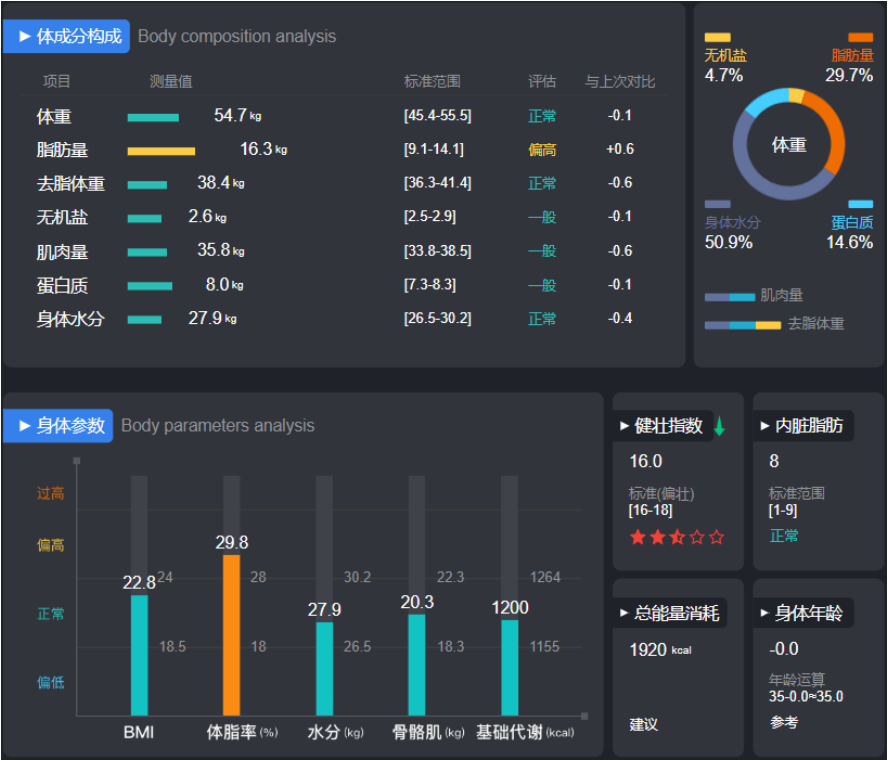Mengapa berat badan Anda berbeda di pagi hari dan malam hari?
Tidak perlu khawatir, ini bukan tanda penambahan berat badan! Tubuh manusia adalah sistem dinamis dan berat badan berubah dari waktu ke waktu. Dari pagi hingga malam, kita makan tiga kali sehari dan minum air, serta beberapa camilan, sehingga berat badan bertambah. Dan pada saat yang sama, baik berjalan, duduk, atau berbaring, semuanya mengonsumsi energi, bahkan bernapas pun akan membuang sebagian air, pergi ke kamar mandi untuk buang air kecil dan buang air besar adalah pengeluaran besar limbah dari tubuh, berat badan akan berkurang.
Dengan menghitung "total asupan energi - total pengeluaran energi", kita dapat menemukan bahwa berat badan di malam hari lebih berat daripada di pagi hari. Secara umum, fluktuasi berat badan antara 1-3 kg adalah normal, jadi tidak perlu terlalu memikirkan perubahan kecil dalam berat badan selama sehari
Persentase lemak tubuh turun, berat badan naik?
Persentase lemak tubuh adalah indikator penting untuk mengevaluasi penurunan berat badan seseorang. Penurunan dalam persentase lemak tubuh mencerminkan penurunan dalam jumlah lemak pada tubuh seseorang. Namun, perlu diingat bahwa penurunan berat badan melibatkan kehilangan lemak di satu sisi dan memperoleh otot di sisi lain. Peningkatan otot mengarah pada perbaikan dimensi tubuh dan secara visual tubuh yang lebih terdefinisi, karena otot lebih padat daripada lemak, sehingga penambahan otot dapat menyebabkan tidak adanya perubahan berat badan atau bahkan kenaikan berat badan. Kehilangan lemak dan peningkatan otot menghasilkan tubuh yang lebih kencang dan terdefinisi dengan lebih baik, yang merupakan pencapaian utama dari penurunan berat badan!
Selain itu, tubuh manusia memiliki inersia. Setelah tubuh terbiasa dengan kondisi tertentu, tidak mudah untuk mengubahnya. Misalnya, berolahraga membutuhkan banyak air dan glikogen, untuk mempertahankan inersia, tubuh akan menyimpan lebih banyak glikogen untuk konsumsi, yang menyebabkan kenaikan berat badan. Namun, ini biasanya terjadi di awal kebugaran, setelah tubuh menyesuaikan dengan perubahan, berat badan tidak akan meningkat.
Setelah menjelaskan masalah "tingkat lemak tubuh turun tetapi berat badan naik", beberapa teman mungkin juga menghadapi situasi "berat badan turun tetapi tingkat lemak tubuh naik". Hal ini bisa disebabkan oleh waktu olahraga yang lebih pendek, berkeringat dan buang air kecil membuat tubuh kehilangan air, sehingga penurunan berat badan jangka pendek, tetapi lemak yang hilang lebih sedikit. Ketika jumlah lemak hampir tetap sama dan jumlah air berkurang, persentase lemak tubuh meningkat.
Apakah kita harus terus berlatih setiap hari jika ingin bugar?
Banyak orang memiliki persepsi tentang kebugaran bahwa mereka harus berlatih selama berjam-jam setiap hari agar efektif. Memang baik untuk memiliki determinasi untuk maju, tetapi Anda tidak bisa terburu-buru. Istirahat yang cukup sebenarnya mendukung hasil latihan yang lebih baik.
Kebugaran seharusnya mengikuti teori pemulihan beban. Istilah "pemulihan beban", juga dikenal sebagai "kompensasi berlebih", merujuk pada salah satu tahap proses pemulihan energi setelah latihan. Pada tahap ini, energi yang dikonsumsi oleh organisme selama olahraga dan fungsi organ serta sistem tubuh tidak hanya dipulihkan tetapi bahkan melebihi batas semula. Tingkat dan kemunculan tahap ini erat kaitannya dengan volume olahraga: semakin besar volume olahraga dan semakin banyak bahan yang terkuras, semakin jelas tingkat pemulihan berlebihan dan semakin lambat waktu kemunculannya.
Semakin sedikit makan, semakin baik kondisi tubuhmu?

Filosofi kebugaran "tiga bagian latihan tujuh bagian makan", berolahraga tetapi juga mengontrol pola makan. Namun ingat, bukan berarti semakin sedikit kamu makan, semakin besar kesempatan mendapatkan tubuh yang baik, sementara itu bisa menyebabkan gejala seperti hipoglikemia, malnutrisi, dll., dan merusak kesehatan. Kita perlu mengetahui strategi olahraga dan diet yang sesuai untuk diri kita sendiri adalah yang terbaik!
Lalu, berapa jumlah yang tepat untuk dimakan? Pertama-tama, kita perlu mengukur metabolisme basal kita. Kita bisa menggunakan Youjiu 3T Intelligent Body Meter untuk menguji metabolisme basal kita, kita juga bisa menguji komponen tubuh lainnya seperti fungsi tubuh dan postur secara bersamaan.
Metabolisme basal merujuk pada jumlah energi yang diperlukan oleh tubuh untuk memenuhi kebutuhan dasar bertahan hidup, yaitu jumlah minimum kalori yang diperlukan untuk menjaga proses kehidupan normal seperti pernapasan, detak jantung, dan suhu tubuh ketika seseorang berada dalam keadaan istirahat. Konsumsi energi total seorang dewasa dalam sehari dapat dibagi menjadi lima bagian: konsumsi olahraga, konsumsi metabolisme basal, konsumsi kehidupan sehari-hari, termogenesis makanan, dan termogenesis adaptif. Penurunan lemak, sebagai bagian penting dari kebugaran, didasarkan pada prinsip bahwa asupan kalori lebih sedikit daripada pembakaran kalori, menciptakan defisit kalori. Ide umumnya adalah "makan lebih sedikit dan latihan lebih banyak", tetapi hal ini juga dapat menurunkan metabolisme basal dan mengurangi pembakaran kalori, membuat sulit untuk menciptakan defisit kalori meskipun makan sangat sedikit. Oleh karena itu, jumlah asupan makanan harus dipertimbangkan untuk menyeimbangkan metabolisme basal. Selain makan dengan bijak, melakukan pelatihan pembangunan otot juga dapat meningkatkan metabolisme basal hingga tingkat tertentu. Ingatlah, program latihan yang tepat didasarkan pada pemeliharaan dan peningkatan metabolisme basal.
 Berita Terbaru
Berita Terbaru2024-12-16
2024-11-21
2024-10-17
2024-09-06
2024-01-24
2024-01-10